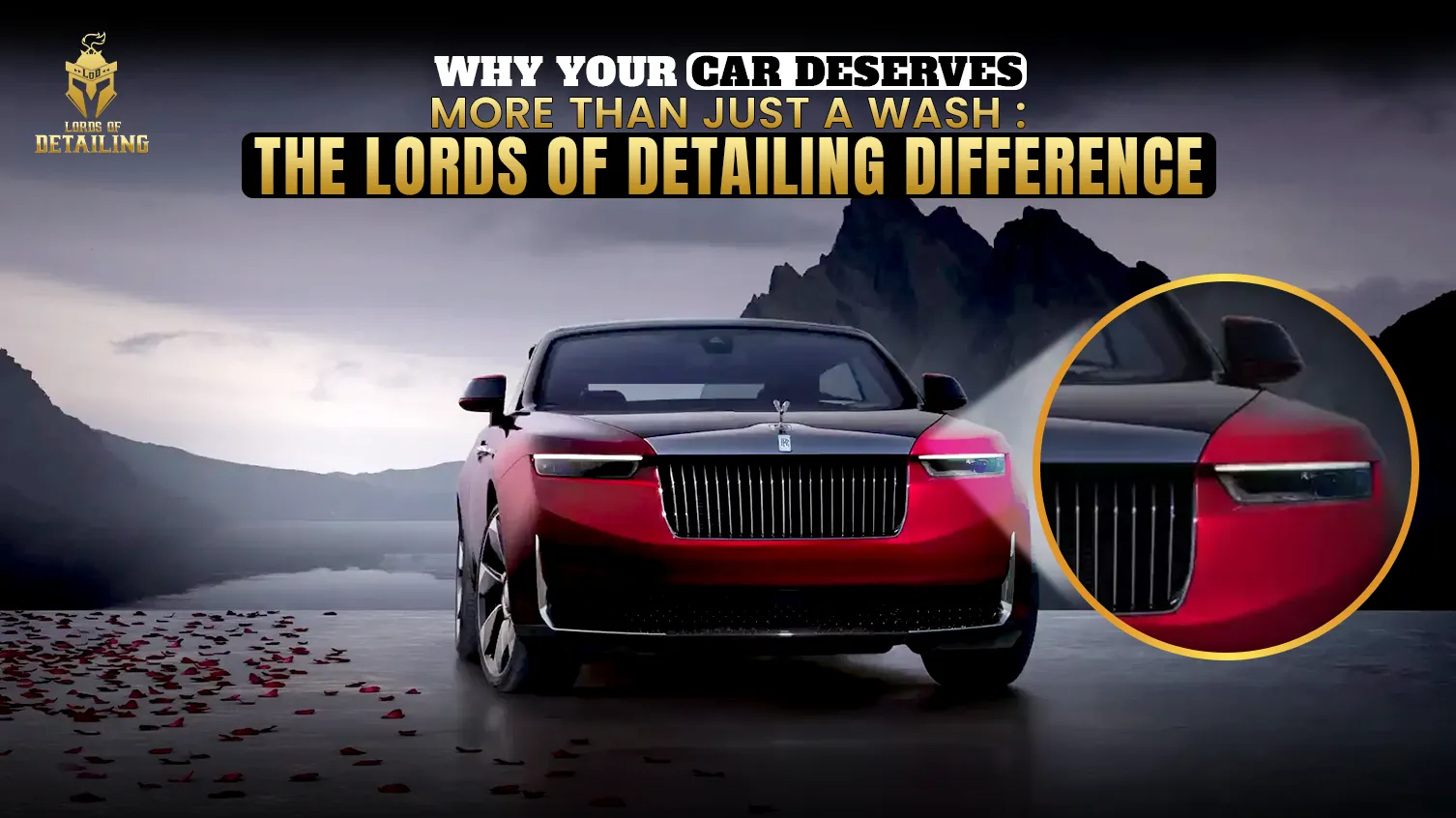
In today’s world, where we spend a significant amount of money on our cars, it’s essential to protect that investment. And while we often focus on regular washes or applying wax for shine, there’s a better, long-lasting solution to keeping your car in pristine condition: ceramic coating. You may have heard of this “invisible shield” before, but what exactly is it? And why should you consider it for your car? Let’s dive into the world of ceramic coating and discover why it’s the shield your car deserves.
The Science Behind Ceramic Coating
What is Ceramic Coating Made of?
Ceramic coating is a liquid polymer primarily composed of silica and other natural or synthetic compounds. When applied to a car’s surface, this mixture bonds with the paint to form a semi-permanent, invisible layer of protection. Think of it as a glass-like armor for your vehicle that’s incredibly thin but impressively tough.
How Ceramic Coating Works on a Molecular Level
At its core, ceramic coating creates a chemical bond with your car’s paint. Once applied, it forms a hydrophobic (water-repelling) layer that helps protect against contaminants like dirt, grime, and water. This coating essentially fills in the microscopic imperfections on the paint, creating a smooth, hard surface that debris struggles to stick to.
Hydrophobic Properties Explained
Ceramic coating’s hydrophobic properties are one of its standout features. Water, instead of settling on your car’s surface, beads up and rolls off effortlessly, taking dirt and grime with it. This means fewer water spots, less damage from acidic rain, and a cleaner car with far less effort.
Benefits of Ceramic Coating for Your Car
Protection Against UV Rays
Sunlight can wreak havoc on your car’s paint, causing it to fade and oxidize over time. Ceramic coating acts like sunscreen for your car, reflecting harmful UV rays and maintaining that vibrant paint job longer.
Resistance to Chemicals and Contaminants
Ceramic coating creates a tough barrier that protects your car from harmful chemicals found in road salt, bird droppings, tree sap, and even acid rain. These contaminants, which can cause lasting damage, are less likely to penetrate your car’s surface with a ceramic coating in place.
Keeps Your Car Looking Shiny and New
Who doesn’t love that “just detailed” shine? Ceramic coating enhances the depth and clarity of your paint. By forming a reflective surface, it gives your car that fresh, glossy appearance you’d expect from a showroom vehicle.
Easier Cleaning and Maintenance
Because dirt and grime have a harder time sticking to ceramic-coated cars, cleaning becomes a breeze. A simple rinse with water or a light wash removes most contaminants, saving you time and effort on maintenance.
How Ceramic Coating Compares to Wax and Sealants
Longevity of Ceramic Coating vs. Wax
Traditional waxes wear off after a few weeks or months, especially if exposed to harsh weather conditions. Ceramic coating, on the other hand, can last years, providing a much more durable solution to protect your car.
Enhanced Protection
While waxes and sealants offer some degree of protection, they don’t compare to the advanced chemical properties of ceramic coatings. The level of protection against UV rays, oxidation, and environmental contaminants with ceramic coatings is superior.
Cost Comparison
Ceramic coating does come with a higher upfront cost compared to waxing, but it’s a long-term investment. Waxing needs to be redone frequently, whereas ceramic coating lasts for years, making it more cost-effective in the long run.
The Application Process: How is Ceramic Coating Applied?
Professional Application vs. DIY
Ceramic coating can be applied both by professionals or as a DIY project. However, professional installation typically yields better results due to the specialized tools and expertise involved. DIY kits are available, but they require a meticulous, error-free application.
Preparation and Pre-Coating Steps
Before applying ceramic coating, the car’s surface must be thoroughly cleaned and decontaminated. Paint correction might also be necessary to remove any existing scratches or imperfections, ensuring the ceramic coating bonds properly.
Common Mistakes to Avoid During Application
The biggest mistake when applying ceramic coating is not preparing the surface correctly. Skipping the prep work can result in the coating failing to adhere, leaving streaks or uneven protection.
How Long Does Ceramic Coating Last?
Factors That Impact Longevity
Ceramic coating can last anywhere from two to five years depending on the quality of the product used, the environment the car is exposed to, and how well it’s maintained. Regular upkeep can help extend the life of the coating.
Maintenance Tips to Maximize Durability
To maximize the life of your ceramic coating, it’s important to wash your car regularly using mild, pH-balanced soap. Avoid abrasive cleaning materials, as they can wear down the coating over time.
Misconceptions About Ceramic Coating
Ceramic Coating is Not Scratch-Proof
One of the most common misconceptions is that ceramic coating makes your car scratch-proof. While it offers a degree of scratch resistance, it’s not bulletproof. You’ll still need to be mindful of how you handle and care for your car.
It Won’t Replace Regular Car Care
Ceramic coating isn’t a “set it and forget it” solution. You’ll still need to wash your car and maintain it properly to ensure the coating’s longevity and effectiveness.
Overhyped Marketing Claims vs. Reality
Some marketing materials make ceramic coating seem like magic. While it’s incredibly beneficial, it’s not a miracle cure for all car-related issues. Understanding what it can and cannot do will help set realistic expectations.
Is Ceramic Coating Worth It?
Long-Term Financial Investment
Although ceramic coating is more expensive upfront, it can save you money in the long run by reducing the need for frequent waxing, paint correction, and other maintenance procedures.
Value for Car Enthusiasts and Everyday Drivers
For car enthusiasts, ceramic coating is a no-brainer for maintaining the vehicle’s appearance and value. Even for everyday drivers, the convenience of easier cleaning and longer-lasting protection makes ceramic coating a worthwhile investment.
DIY Ceramic Coating vs. Professional Installation
Pros and Cons of DIY
While DIY ceramic coating kits can save you money, the process is often time-consuming and leaves room for error. If not done correctly, it may not offer the same level of protection as a professional installation.
What You Get with a Professional Service
A professional service typically offers more than just the application. They’ll often perform paint correction, ensure a perfect installation, and provide warranties that DIY kits can’t match.
Conclusion
In the end, ceramic coating is an excellent investment for anyone who wants to protect their car’s exterior while keeping it looking new. Though not a cure-all, its benefits in protection, appearance, and ease of maintenance make it the invisible shield your car deserves.
FAQs
- Can ceramic coating be applied over paint protection film (PPF)?
Yes, ceramic coating can be applied over PPF for additional protection and a glossy finish. - How long does ceramic coating take to cure completely?
Full curing typically takes around 24 to 48 hours, but it can take up to two weeks to fully harden. - Will ceramic coating prevent water spots on my car?
While ceramic coating helps reduce water spots due to its hydrophobic nature, it doesn’t eliminate them entirely. - Can ceramic coating be applied to other surfaces like glass or wheels?
Yes, many ceramic coatings are versatile and can be applied to glass, wheels, and even plastic trims for added protection. - Does ceramic coating affect the color of the car’s paint?
No, ceramic coating enhances the paint’s natural color and adds a glossy, reflective finish without changing its hue.
















 Service Estimate
Service Estimate
 8750305020
8750305020


